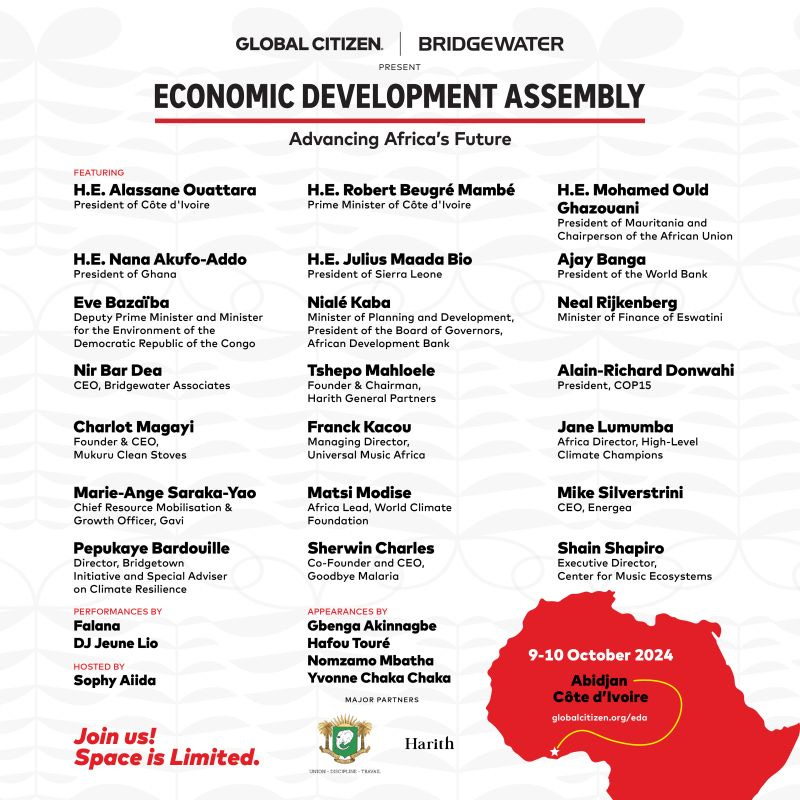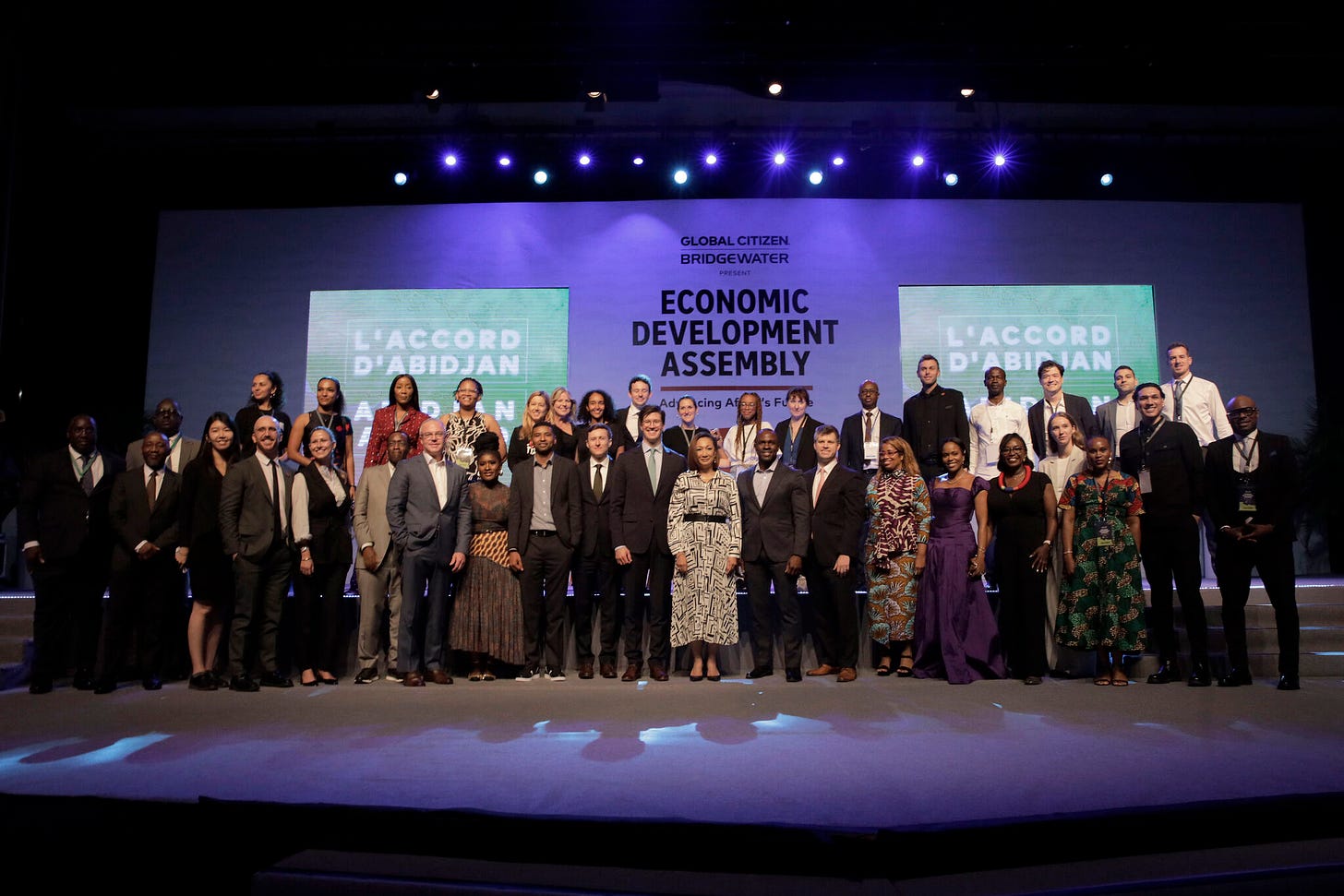Hello all. Firstly, I have nearly 600 subscribers for Making Places Better, so thank you to all who have subscribed, read, and shared this blog. It means the world. As I’ve said, this Substack will be 100% free and open. If you wish to support my writing, I will donate 100% of everything I receive to the Center for Music Ecosystems.
Now, onto some new ideas…
Last week, I had the pleasure of visiting Abidjan, Cote d’Ivoire, to speak at the Global Citizen and Bridgewater Associates’ Economic Development Assembly.
The Assembly's purpose was to advocate for the replenishment of IDA 21, which will be decided in Seoul in December. IDA (International Development Association) is the World Bank's funding mechanism for emerging markets, offering grants and low-interest loans to developing nations. Its funding is renegotiated every three years. This summit was to advocate for the G20 nations to fund the replenishment at $120bn USD, as they represent 85% of the global economy. Many countries, including Germany and the UK, have reduced their international development aid funding, and many vital goals, including reducing extreme poverty, have flatlined since the pandemic. This is pressing, essential, and integral work, which is what brought heads of state and leaders to Abidjan last week.
Now, are you thinking… what does this have to do with music, culture, and improving places? Well, from a policy angle, very little for the longest time. But this is changing, and that is why I was there. Development banks and international aid funding have long ignored music and the broader creative economy. This is because the functioning of these industries - music, film, creative arts - was not seen as core infrastructure but as an output of a place having core infrastructure. It’s what happened once the initial work had been done, and I get why that’s the case; you can’t have a functioning recording studio or creative hub if there’s no electricity or paved roads. However, across Africa and Latin America, there are examples of this changing, where the creative economy is being invested in as infrastructure - i.e., core to the holistic development of the place. Afreximbank is leading the way with a dedicated $500m credit facility for the creative economy. There are other examples at the African Development Bank and in Latin America at the Inter-American Development Bank. However, how music and the creative economy could factor in, holistically, to justify the IDA replenishment (ensuring value for money for donors) remains in its infancy. There is no holistic, overarching structure, datasets, or projected outcomes outlining how investing in music and the creative economy as development improves outcomes. And that is what took me to Abidjan. As this is what we’re going to prove.
In Abidjan, I announced a partnership between the Center for Music Ecosystems and Global Citizen. We will collaborate to develop research and data to ensure music and the creative economy are incorporated into development finance. Universal Music Group is part-funding the research, and here is the vision we wrote explaining what we’re doing and why we’re doing it.
We aim to build a dataset - alongside the UNDP - where every global funder could access information to help structure and de-risk investing in music and the creative economy. We want to - and will - prove that investing in these sectors - much like any other core sector - is investing in physical and human infrastructure. This includes ensuring every country can cost-effectively deploy, track, and benefit from such an investment, which requires functioning copyright policies, creative education and infrastructure, and recognizing that music and the arts are jobs, plain and simple.
One of the core challenges of music—as a global economy—is that it is not a global economy in the sense that everybody has access to it. Music may be everywhere, but if countries lack policies, regulations, and a basic understanding that this is an industry that creates and sustains good jobs, then it will continue to suffer from value leakage—the total money it could make differs from the amount it is making. With Global Citizen and other partners, we will prove that music (and, as we go, other creative sectors) are drivers of economic growth and can be lucrative tools to invest in and demonstrate that the IDA replenishment produces effective ROI everywhere.
In Abidjan, I moderated a roundtable on this topic with development finance expert Adaku Ufere and actor Gbenga Akinnagbe. Then, I participated on a panel with four amazing folks: Franck Kacou, Head of Francophone West Africa for UMG, South African actor and producer Nomzamo Mbatha, Canadian-Somalian musician Falana, and journalist Sophy Aiida. We then announced this new partnership with Global Citizen and its co-founder,
.All of this concluded with the Abidjan Accord, a statement signed by 100+ leading organizations (including us) to advocate for the complete replenishment of IDA. Music is firmly and proudly a part of this Accord. We signed it.
I recall half a dozen conversations in which I explained how music can be a tool to address some of the world’s biggest challenges. And in all of them, the person I spoke with never ‘thought of it that way.’ Like most of us, we ignore the potential value that music can have because it’s ubiquitous. Being given an opportunity to be part of this change is an incredible privilege.
The follow-ups and work begin, including writing a business plan for a global funder on creating a music finance facility. Watch this space. We have work to do.
If you’d like further information on the initiative or this work, please message me, and I’ll share.







Now this is exciting work! Showcasing Music as a force for social change at the macro level
Fantastic to announce this partnership with you. Looking forward to developing the research base as to why music and creative economy can be a key driver of poverty alleviation.